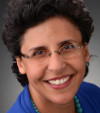21st Karlsruhe Dialogues - Speakers
Women and Sharia Law: The Impact of Legal Pluralism
PD Dr. Elham Manea
Speaker

Statements
1. In your opinion, which “enemies” pose the greatest threat to pluralistic societies?
Two forces and one factor pose the main threat to a plural society.
The two forces are: the far right and Islamist movements. The far right plays on the fears of the majority population in an increasingly insecure world, reduce migrants to their religious identity, and denounce them as the culprits that stand in the way of the far right’s vision of restoring a ‘pure(r)’ society.
Islamist movements (especially the non-violent forms) seek to undermine the very values and norms that constitute a secular, democratic, and human rights-based plural society. They play on the insecurity of ordinary citizens, politicians, and the authorities in dealing with their demands, and they push for measures that foster closed societies with parallel norms and legal structures. They also seek to win young people for their ideology by playing on the identity crisis of these youths.
The problem is exacerbated by the inability of mainstream politicians and civil society actors to insist that there are rules of the game which are binding to all members of the society. The social fabric and cohesion is at risk if people experience that some ‘groups’ are treated differently, according to different norms and rules. This is fertile ground for extremists and populists to exploit a sense of frustration for their own purpose.
2. Public trust in elites and the media has been declining in recent years. What do you think can be done in order to restore this trust?
Through a clear, honest, and differentiated articulation of the problems that our societies are evidently faced with, using a language understood by all. The elites and media should no longer shy away from discussing issues that are considered ‘sensitive’ or ‘politically incorrect’. They should listen to and be willing to engage with people living or working in areas where it has become obvious that multiculturalism is not working.
3. In pluralistic societies, how can awareness of the advantages of freedom – and the appreciation thereof – be raised, in particular when it comes to those who lack experiences with unfreedom?
I endeavour to foster this awareness in the daily work with my students. In the case of my Swiss students, i.e. those without a migration background, I make a deliberate effort to highlight how this freedom and rights were hard won, and that they must not be taken for granted. I also emphasise that the fight for freedom and human rights is a universal one and what we enjoy here are achievements that must not be considered as trivial and are to this day worth fighting for.
In the interaction with my international students and those with a migration background, I use facts and examples to show that: a) Western societies went through the same stages and problems facing societies in other parts of the world (the issue of women’s rights – voting rights and family law – in Switzerland is a good example); b) that certain assumptions do not stand a reality check and scrutiny. For example, some of my students are initially convinced that Islamic law is synonymous to justice and equality. I make them aware of the historical context within which the rulings of Islamic law were articulated (between the 7th and 10th century) and demonstrate in concrete ways what Sharia means for women, children, people of other faiths, or those who turned away from Islam.
